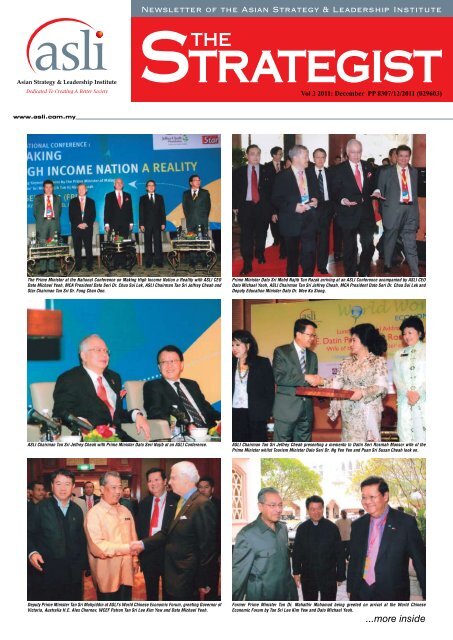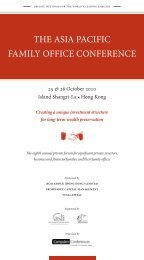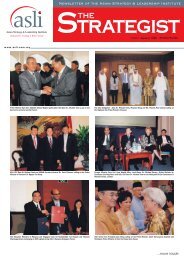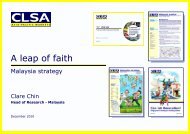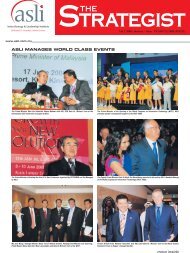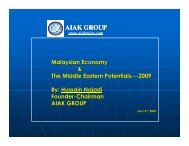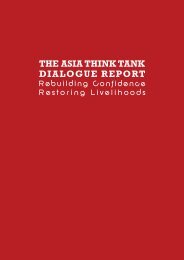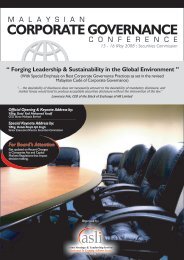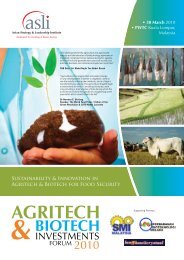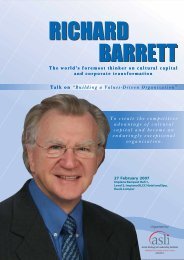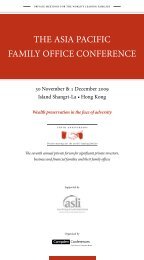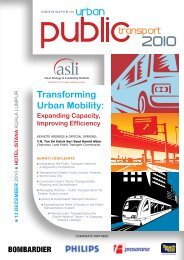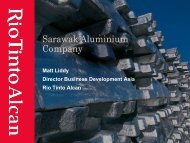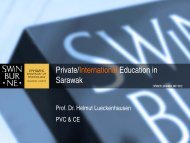...more inside - Asian Strategy & Leadership Institute
...more inside - Asian Strategy & Leadership Institute
...more inside - Asian Strategy & Leadership Institute
Create successful ePaper yourself
Turn your PDF publications into a flip-book with our unique Google optimized e-Paper software.
TOWARDS A HIGH INCOME NATIONASLI Chairman Tan Sri Jeffrey Cheah presenting a memento to the Prime Minister Dato Sri Mohd Najibwhilst MCA President Dato Seri Dr. Chua Soi Lek look on.ASLI Chairman Tan Sri Jeffrey Cheah, Prime Minister Dato Sri Mohd Najib and MCA PresidentDato Seri Dr. Chua Soi Lek sharing a light moment after the conference opening.Housing and Local Government Minister Dato Seri Chor Chee Heung moderating a session with Ms. TriciaYeoh, Dr. Tai Cheh Chin and Roshan Thiran.Dr. Tan Wei Lin, Dato Chua Tee Yong, Senator Gan Ping Sieu and Mr. Timothy Tiah.Malaysia’s ambitious plans to transform into a high income, competititiveand innovation led growth economy is an exciting programme that will bringimmense benefits and create many new opportunities for Malaysians. Atthe same time there are many challenges for us to overcome and issuesto address before this transformational vision becomes a reality.The National Conference on ‘Making High Income Nation a Reality’ heldon Friday, 23 September 2011 was co-organised by ASLI and INSAP, inStrategic Partnership with The Star Publication, and was supported bythe Jeffrey Cheah Foundation set the stage for key stakeholders to feelthe pulse of development and to take stock of challenges, issues andopportunities available in our journey towards becoming a High IncomeNation. The Conference also provided a timely opportunity for participantsto deliberate on the goals, strategies and plans, besides enablingparticipants to discuss and debate what needs to be done to turn thisvision of Malaysia becoming a High Income Nation into a reality.Prime Minister of Malaysia YAB Dato Seri Mohd Najib graced theConference. In the Prime Minister’s Official Opening Keynote Address,he called on all Malaysians to be committed to the National Mission inachieving the “Vision 2020”. The Prime Minister urged the people thatin the spirit of 1Malaysia; tolerance, total acceptance and appreciatingMalaysia’s diversity to move forward as a nation is vital in movingMalaysia forward.During the session on Malaysia’s Transformational Journey TowardsBecoming a High Income Nation, speakers believe that 2010 andbeyond brings a new influx of areas that the Malaysian economy shouldreally focus on and attempt to be a big part, if it is to make up for theslowdown of the last decade and in moving towards the aim of a highincome nation. Tan Sri Dato’ Azman Mokhtar, Managing Director ofKhazanah Nasional Bhd highlighted that an improvement in productivityand productivity-led growth are critical in driving the economy withouthaving to drive inflation up. It was said that productivity could be betterachieved, if better governance, better education, talent, corruption andwastage, as well as fiscal discipline could be emphasised. Tan Sri alsomentioned that there is an urgent need for Malaysia’s footprint to growwithin the region. New industries need to be developed, and economycould be further diversifed by incorporating new sectors. Prof Dato’ Dr.Normal Mansor, Secretary-General of the National Economic AdvisoryCouncil then highlighted that bankruptcy law in Malaysia needs to beimproved, venture capital needs to get moving, and a critical mass ofpollcies is needed to support the Strategic Reform Initiatives that havebeen shaped under the New Economic Model.Datuk Chua Tee Yong, Deputy Minister of Agriculture and Agro-basedIndustry, Timothy Tiah, Co-founder of Nuffnang and Dr Tan Wei Lin from1Malaysia Development Berhad spoke at the Dialogue with the Voices ofthe Younger Generation session. Education, wages, affordable housingMr. Steve Wong of ISIS, Dato Lim See Boon, Dato Michael Yeoh and Datuk Denison Jayasooria.Transport Minister Dato Seri Kong Cho Ha, Deputy Woman Minister Senator Heng, Deputy Finance MinisterDato Donald Lim and Khazanah Nasional Managing Director Tan Sri Azman Mokhtar.2
TOWARDS A HIGH INCOME NATIONThe Prime Minister having a light moment with Tan Sri Jeffrey cheah, Tan Sri Ramon Navaratnam, Dato MichaelYeoh and Tan Sri Azman Mokhtar.From right : Deputy Education Minister Dato Dr. Wee Ka Siong, Tan Sri Ramon Navaratnam,Deputy Agriculture Minister Dato Chua Tee Yong, Dato Seri Razman Hashim and Tan Sri Liew Kee Sin.Dato Seri Dr. Chua Soi Lek having a word with ASLI DirectorsTan Sri Ramon Navaratnam and Dato Chew Chee Kin.Transport Minister Dato Seri Kong Cho Ha and SP Setia CEO Tan SriLiew Kee Sin.Deputry Agrilculture Minister Dato Chua Tee Yong with Macrokiosk CEO,Kenny Goh.and work value of Generation Y were discussed extensively during thesession. The panel, moderated by Senator Gan Ping Siew, DeputyMinister of Youth and Sports addressed the question on what wouldsatisfy the sophisticated younger generation, in terms of their ideals ondemocracy and economic participation. An interesting perspective cameabout when one of the speaker raised the question of the meaning of“High Income Nation”. 4 questions were highlighted: Is a high GNI anaim in itself? Do we have the right framework and policies to take usthere? What are the inclusiveness and sustainability aspects of the NewEconomic Model? What are our roles as individuals to make a highincome nation a reality? The speaker emphasized on the need that themission of making Malaysia a High Income Nation should be understoodand accepted by all Malaysians. An intergrated package of reforms wouldbe needed, and all Malaysians must be willing to suffer a little along theway in order to achieve a better overall standard of living.The session on Winning the War on Talent was well received by thedelegates when the issues of lack of incentives for skilled professionalsto work in Malaysia, lack of focus on areas of specialization on andcoherent policies to develop and retain talent, misallocation of resourcesand race based policies, as well as a debate on whether talent is indeednecessary rather than leadership, were addressed. The session wasmoderated by Dato’ Wira Chor Chee Heung, Minister of Housing andLocal Government and panelists in this session were Dr Tai Cheh Chin,Orthopedic Surgeon; Ms Tricia Yeoh, Former Research Officer to theSelangor Menteri Besar; Roshan Thiran, CEO of Leaderonomics.The final session on Turning Vision into Reality focused on issues likeEducation, productivity, racial and ethnic policies, values, beliefs andattitudes; that were seen as obstacles right now for Malaysia to progress.The panel consisted of Dato Lim Si Boon, CEO of Tenby SchoolsMalaysia and Datuk Dr Denison Jayasooria, Principal Research Fellow atKITA, UKM; moderated by Dato Dr Michael Yeoh, CEO of ASlI identifiedtwo main problems that undermine Malaysia’s progress, ie Education;and the heavy involvement of race, ethnicity and religion in politics andeconomic interactions.Dato Seri Dr Chua Soi lek, President of MCA addressed the Conferenceat this Closing Address, and highlighted that immediate attention isneeded to improve productivity. Productivity is vital to satisfy the shorttermneeds, and Education would be the long term measure, in drivingthe Malaysian economy towards achieving a High Income Status.The Conference were attended by 450 delegates and concluded inSunway Hotel Resort and Spa with delegates and speakers stressingboth the importance of all Malaysian coming together to move the countryforward, and the political will and responsibility that the country leadersbear, for-a better shared Malaysia.Sharing a light moment : Tan Sri Jeffrey Cheah, Dato Seri Kong Cho Ha, Dato Seri Chor Chee Heung,Tan Sri Dr. Fong Chan Onn and Tan Sri Tan Kay Hock.Khazanah Nasional Managing Director Tan Sri Azman Mokhtar emphasing a point whilstTan Sri Ramon Navaratnam and Tan Sri Dr. Fong Chan Onn look on.3
ASLI HOSTS3RD WORLD CHINESE ECONOMIC FORUMThe Deputy Prime Minister Tan Sri Muhyiddin Yassin witnessing the exchange of MOU between the ViceChairman of the China Council for Promotion of International Trade Dong Songgen and ASLI Director TanSri Ramon Navaratnam.Former Prime Minister Tun Dr. Mahathir Mohamad and the Governor of Victoria HE Alex Chernov arrivingat the Forum. Behind is Dato Khoo Thaw Choon of Porusus.MCA Ministers at the Forum opening : Dato Seri Liow Tiong Lai Minister of Health, Dato Seri Kong Cho HaMinister of Transport and Dato Seri Chor Chee Heung Minister of Housing and Local Government.WCEF Patron Tan Sri Lee Kim Yew presenting a memento to Penang Chief Minister Lim Guan Eng whilstTan Sri Navaratnam and Dato’ Michael Yeoh look on.Tun Dr. Mahathir Mohamad with London Councillor Edmond Yeo, William Lye of Melbourne and Ms.Anne Lee of Singapore.Minister in the Prime Minister’s Dept Tan Sri Dr. Koh Tsu Koon, Bank Muamalat ChairmanTan Sri Dr. Munir Majid and Banyan Tree Holdings’ Ms Claire Chiang.Against the backdrop of major political and economic shift in many partsof the world, China’s liberalisation and modernization, and the heightenedeconomic uncertainty at the global level, the 3rd World Chinese EconomicForum with the theme Linking East and West in a Globalised World convenedin Kuala Lumpur to address China’s increasing importance to Asia and to theglobal economy, as well as the integral role that it continues to play in drivingregional and global economic recovery.The World Chinese Economic Forum (WCEF) brought together eminentbusiness and thought leaders from Europe, USA, Asia and Australasia tonetwork, share ideas and experiences. This year, the 3rd World ChineseEconomic Forum met at a moment when investors all around the world arerisk-averse.The 3rd World Chinese Economic Forum drew on knowledge and experienceof 60 speakers from 25 countries and 500 delegates from 33 countries. Multistakeholdersexplored possible futures for the world and the region, basedon regional politics, resources and economic engagements. The Forum findsnew perspectives on what has indeed been a tumultuous time of changeeconomically in the region and globally, with the unfolding of the sovereigndebt crisis in Europe and the U.S. recession.In a variety of session formats, speakers and participants discussedtopics ranging from China’s Tranformation? What’s next for China? Is AsiaDecoupling from the USA-led by China’s Rise? Is the Beijing consensusbetter than the Washington consensus? Is China’s growth sustainable?China Rises, ASEAN & East Asia Benefits: How China’s Growth is Impactingthe Region? Can companies in the region meet the China challenge andenhance their competitiveness? Rethinking the World of Money. The impactof Chinese Investment flows in US Treasuries, M&A or SWF driver investmentis significant. How will this impact on financial hubs? Building Bridgesbetween China, ASEAN and the Middle East: Creating a New GrowthTriangle. The Changing Role of the Global and Regional Chinese Diaspora-Investment Dollars, Human Talent and Nation-Building. How can the ChineseDiaspora contribute to economic prosperity, promoting inter-ethnic harmonyand closer international understanding? What will be the changing roles ofthe Chinese Diaspora in the 21st Century, in a globalised world? GlobalChinese Entrepreneurship?Growing the Bamboo Network Globally. How cannon-Chinese entrepreneurs learn from and benefit from partnerships withthe Chinese entrepreneurs? <strong>Leadership</strong> Forum-?Transformational Changeand <strong>Leadership</strong>-Transforming Nations, Communities and Companies. Whatare the major lessons learnt from transformational leaders? What are thekey attributes of transformational leadership? CEO Forum-- Leading andManaging Growing Companies. What is the power of vision? How to overcomeadversities and what are the pitfalls to avoid? Investment Roundtable-NewEconomic Sectors- What are the New Hot-Spots and Sectors?The Forum this year highlighted the fact that China’s unremitting explorationsand liberalisation policy have not only benefited the 1.3billion people of China,but also people from around the world. It calls to action the range of existingand potential stakeholders to fully and jointly participate in growing a healthyglobal economy. The Forum took note that the emergence of China is notsomething we all should be wary of, in fact it should be quite the opposite - astrong and stable source of growth in the global economy which will benefitcountries from Southeast Asia to South America, from America to Africa.The Deputy Prime Minister of Malaysia Tan Sri Muhyddin Yassin addressedthe Forum at its Official Opening Ceremony. He recognised that the MalaysianChinese Businessmen have been our main domestic investors, and thatthe Malaysian Chinese Businessmen has been an active contributor to theMalaysian economy. The Deputy Prime Minister called upon the Chinesebusiness community to continue to play an active role in the next stage of thecountry’s development.Tourism Minister Dato’ Seri Dr. Ng Yen Yen said ASEAN, China and theMiddle East should foster closer ties with each other. She said these threeregions can forge a new growth triangle to lead the world in economic growth.Former Prime Minister Tun Abdullah Ahmad 8adawi said trade, finance andinvestment should remain important in enriching platforms to launch the newgrowth triangle. Meanwhile, Penang Chief Minister Lim Guan Eng said the4
ASLI HOSTS3RD WORLD CHINESE ECONOMIC FORUMThe Deputy Prime Minister Tan Sri Muhyiddin Yassin arriving at the Forum accompanied by ASLI CEO andWCEF Chairman Dato Michael Yeoh and WCEF Patron Tan Sri Lee Kim Yew.Governor of Victoria Alex Chernov and Chairman Straits Exchange Foundation, Taiwan Dr. Chiang PingKun.people must be given the freedom to operate against the norm if the countryhoped to allow innovation to take seed and grow. Other speakers at the Forumsaw the potential in China’s green sector particularly in energy savings andenvironmental protection, clean-energy vehicles and renewable energy.A speaker pointed out that economic power is measured by way of looking atwhere the spotlight points to; which country has the economic push and pullfactor in the economic architecture. An example would be when the symbolismof the French President calling an <strong>Asian</strong> Leader for aid in light of the EuropeanEconomic Crisis said it all. Therefore China, is set to become the world’sbanker. Another interesting, yet, long forgotten economic theory was shared-‘there is a great advantage to being the last to start in terms of development’.Asia is in the stream line of Europe and the USA who are tired and aging, andAsia has the most populated areas of scarce natural resources. Therefore,Asia is going to take the lead, China in particular. However, a speaker fromChina humbly pointed out that the future of sustainable economic growth ofChina will certainly face a <strong>more</strong> complex transformation of pressure, and itsdevelopment path will also be <strong>more</strong> challenging.This year, the Forum also witnessed the signing of 2 framework agreementsworth RM2.5billion between Iskandar Investment Bhd and Qingdao ZhuoyuanInvestment Holding, a China based company, for the development of a mixedresidential and commercial projects in Medini Iskandar. ASLI formalised itslong relationship with the China Council for the Promotion of InternationalTrade and China Development <strong>Institute</strong>, and was witnessed by the DeputyPrime Minister of Malaysia YAB Tan Sri Muhyddin Yassin.Another new dimension of the World Chinese Economic Forum (WCEF) 2011was the conferment of the Lifetime Achievement Awards to honour someoutstanding personalities who have achieved distinction and excellence intheir industry or profession. WCEF is honoured to confer the WCEF LifetimeAchievement Award to YAB Dato Seri Mohd Najib, Prime Minister of Malaysia;Dr John So, Former Lord Mayor of Melbourne; Tan Sri Khoo Kay Peng,Chairman & Chief Executive of Malayan United Industries Berhad; Tan SriDr Jeffrey Cheah, Chairman of Sunway Group; Ho Kwon Ping, ExecutiveChairman of Banyan Tree Holdings; Tan Sri Lee Oi Hian, Executive Chairmanof Kuala Lumpur Kepong Berhad; Ronnie Chan, Chairman of Hang LungProperties, Hong Kong; Jack Ma, Chairman and CEO of Alibaba Group,Hong Kong; Tan Sri Vincent Tan, Chairman of Berjaya Corporation Berhad;Dato’ Dr Vijay Eswaran, Executive Chairman of QI Group; Tan Sri AnthonyFrancis Fernandes, CEO of Air Asia Berhad; and Tan Sri Tiong Hiew King,Chairman of Sin Chew Jit Poh.In our 3rd year, the World Chinese Economic Forum has evolved into aserious and major international event. Building on the success of pastWCEFs, the City of Melbourne and the State Government of Victoria wherea large number of the Chinese Diaspora resides will be hosting the 4th WorldChinese Economic Forum (WCEF), in November 2012. The support of theAustralian and Victorian State Governments is encouraging for it will furthercement the linkages between Australia, Southeast Asia and China. TheGovernor of Victoria HE Alex Chernov, in his Closing Remarks at the 3rdWCEF said that ‘it is an honour to welcome the 4th World Chinese EconomicForum to Melbourne. We look forward to working with ASLI and the WorldChinese Economic Forum in the coming months to make the 4th WCEF asuccess.’The 3rd WCEF was endorsed by the Ministry of International Trade &Industry, Malaysia. We thank our Strategic Partners- Malaysia PacificCorporation Berhad, Maybank (Malayan Bank), the Malaysian ChineseAssociation (MCA), Iskandar Investment and Porosus; and our CorporatePartners Kuok Brothers Sdn. Bhd., TAK Group of Companies, Kuala lumpurKepong Berhad, and Janakuasa for their continuous support. We would alsolike to thank our Supporting Organisations, The Chinese Professional andBusiness Association, the China Council for the Promotion of InternationalTrade (CCPIT), Invest Hong Kong, China Development <strong>Institute</strong> (COl), TheIndonesian Chinese Entrepreneur Community, the China Association ofMayors, and the China Chamber of Commerce for Import and Export ofMachinery and Electronic Products.Mr. William Lye Past President Chinese Professionals and Businessmen Association Melbourne, Mr.Edmond Yeo Chairman Chinese Advice and Information Centre, London, Mrs. Pansy Wong former Ministerof Immigration and Women Affairs, New Zealand and Ms. Anne Lee, Singapore Chinese Chamber ofCommerce Young Entrepreneur Committee.Minister of International Trade and Industry Datuk Seri Mustapa Mohamed and Tan Sri Lee Kim Yew.Tan Sri Lee Kim Yew Deputy Chairman Country Heights, Tan SriVincent Tan Chairman Berjaya Group, Tan Sri Khoo Kay PengChairman MUI Group, Tan Sri Lee Oi Hian, CEO Kuala LumpurKepong Group at the Forum Dinner.Chairman Australia China Forum Michael Johnson with EuropeChina Forum Chairman Mr. Pierre Calame.5Star Publications Chairman Tan Sri Dr. Fong Chan Onn, President ofthe Senate Tan Sri Abu Zahar Ujang, and Tan Sri Dr. Abdul HamidPawanteh.
ASLI ORGANISESWORLD WOMEN ECONOMIC FORUMEconomic Empowerment for Women: Issue and Challenges session together with Mr Suhaimi Sulaiman,Executive Producer and Anchor of Astro Awani, Datin Paduka Marina Mahathir, Activist & Blogger, TanSri Dato’ Sri Rafidah Aziz, Former Minister of International Trade & Industry, Malaysia and Advisor,Malaysia-Europe Forum and H.E Maria I. Rendon Ambassador Extraordinary and PlenipotentiaryEmbassy of the Argentina Republic.Some guests and speakers attending WWEF.Professor Datin Paduka Dr Jamilah Ariffin, President, Asia Pacific Forum on Families & JUITA, Datuk DrRebecca Fatima Sta Maria, Secretary General, Ministry of International Trade & Industry, Tan Sri (Dr)Rafiah Salim, Director, NAM <strong>Institute</strong> for the Empowerment of Women, Ms Sherrie Doyon de Toma, BoardMember, Women without Boarders / Director, UBS Bank, Austria and Dato’ Dr Nik Ramlah Mahmood,Managing Director, Enforcement, Securities Commission Malaysia.mere 10 % due to women having low skills, the lacked of access to educationand other opportunities, discrimination at the work place, and culturalimpairments. Women engaged in economic opportunities are empoweredthrough their income, education, and support structures and networks fortheir well-being and societies as she added on. In UNDP report, the GDP ofcountries increased as women are engaged in the labour market.She continued that the prominence of women cannot be refuted in varioussectors; the glass breaking must be an ongoing process. As working women,the juggling between work and home are the challenge that women whilefacing the rapid transformation of the world. In Malaysia, since independence,women have been participating in politics and economy through thechampioning the advance status of women. She added that since 1976-1980,projects and legislations has been introduced to mainstreaming women indevelopment. This was further strengthen with the national policies in 1989and followed by the establishment of the Ministry of Women and CommunityDevelopment in 2001. In 2009, the 2nd National Policy on Women and TheWomen Development Action Plan was launched.Datin Paduka Seri Rosmah continued that the Malaysian government hasalso pledge to achieve the UN Millennium Goals by 2050, as well as theConvention on elimination of discrimination against women and the ILOConvention on the equality. The women entrepreneurship developmentprogrammes were pushed in 2010 for women entrepreneur advancement.Recently, the government also pushed for 30% women on the board anddecision making position in the corporate sectors. Participation in professionaland high value jobs has been increased as well. Malaysia also boostmany women in leadership positions in government, corporate, NGO andvarious sectors through gender equality and women empowerment of thegovernment’s efforts.Speakers and guests attending dinner hosted by Puan Sri Dr Susan Cheah.Some of the highlights of the WWEF are sessions on Women in Business:Economic Empowerment, Entrepreneurs and Small Business Development,Managing an International Enterprise: A Conversation with Top CEOs,Women Empowerment through Policy Development and Confession ofAchieve-aholics: Balancing Act between Careers and Family.Among the distinguished speakers include Sue Sheldon, Chairman,Freightways Limited New Zealand; Leah Goodman, General Manager,Singapore, Malaysia & Brunei Sanofi-aventis (M) Sdn Bhd ; Sherrie Doyon deToma, Board Member, Women without Boarders / Director, UBS Bank, Austria;Dato’ Dr Nik Ramlah Mahmood, Managing Director, Enforcement SecuritiesCommission Malaysia; Dr Husna Ahmad CEO, Faith Regen Foundation,London; Katja Rembrandt, Director, Asia Pacific Diversity Foundation,Australia; H.E. Lyudmila G. Vorobyeva Ambassador, Embassy of the RussianFederation; Suhaimi Sulaiman, Executive Producer and Anchor Astro Awani;Kamarul Bahrin Harun, Anchor Astro Awani; Tanri Abeng, Chairman, GlobalMedia Group / Founder, Tanri Abeng University & Former Minister of StateOwned Enterprises, Indonesia, The Hon. Dato’ Sri Dr Ng Yen Yen, Minister ofTourism Malaysia; Tan Sri (Dr) Rafiah Salim, Director, NAM <strong>Institute</strong> for theEmpowerment of Women; Datuk Dr Rebecca Fatima Sta Maria, SecretaryGeneral, Ministry of International Trade & Industry; Professor Datin PadukaDr Jamilah Ariffin, President, Asia Pacific Forum on Families & JUITA;Prof Dr Adeeba binti Kamarulzaman, Professor, Department of Medicine,University of Malaya; Sheriffah Noor Khamseah AI-Idid binti Dato’ SyedAhmad Idid, Author & Innov ation Advocate; Fadzilah Ahmad Din, SeniorDirector, Business Development Division, SME Corp; Carol Yip, Founder &Chief Executive Officer, Abacus Advisory Sdn Bhd; Norina Yahya, TV Host;H.E Maria Bassols Delgado, Ambassador, Embassy of Spain and MisakoTakahashi, Economic Counsellor, Japanese Embassy.Puan Sri Dr Susan Cheah, Exco Sunway Group & Director ofASLI and Dr Husna Ahmad, Chief Executive Officer, Faith RegenFoundation, London.Ms Kamala, Ms Mela and Ms Shaireen Waris together with PuanSri Dr Susan Cheah, H.E Dr Amal Mussa Hussain Ali Al-Rubaye,Ambassador Extraordinary and Plenipotentiary, Republic of Iraq andH.E Maria I. Rendon Ambassador Extraordinary and PlenipotentiaryEmbassy of the Argentina Republic.7Ms Sherrie Doyon de Toma, Board Member, Women without Boarders /Director, UBS Bank, Austria, Ms Margot Cairnes, Founder and Chairmanof Zaffyre International Pty Ltd, Datuk Siti Azizah Sheikh Abod, SpecialOfficer to the Prime Minister and Prof. Dato’ Dr. Sharifah Hapsah SyedHasan Shahabudin, Vice-Chancellor, Universiti Kebangsaan Malaysia(UKM).
16TH MALAYSIAN CAPITAL MARKET SUMMITTan Sri Ramon Navaratnam, Chairman ASLI CPPS presenting a memento to Dato’ Seri Ahmad HusniHanadzlah, Minister of Finance II.Dato’ Mohamed Iqbal Rawther, Chairman, Malaysian <strong>Institute</strong> of Management welcome Dato’ SeriAhmad Husni Hanadzlah, Minister of Finance II. Looking on is Tan Sri Ramon Navaratnam, ChairmanASLI CPPS.Tan Sri Ramon Navaratnam, Chairman ASLI CPPS presenting a memento to Tun Mohamed DzaiddinAbdullah, Chairman, Bursa Malaysia Berhad.Mr. Zakie Ahmad Shariff, CEO, FA Securities with Tan Sri Dato’ Azman Haji Mokhtar, Managing Director,Khazanah Nasional Berhad.ASLI organized its 16th Malaysian Capital Market Summit with the theme “TheNew Normal After The Global Financial Crisis - Capitalising on TransformationOpportunities” on 24th and 25th November 2011 at the Sheraton ImperialKuala Lumpur Hotel. This Annual Series of Malaysian Capital MarketSummits, now in its 16th year has been a premier gathering of institutionalinvestors, economists, analysts, fund managers and corporate players to feelthe pulse of the Malaysian capital market and to evaluate the economic andinvestment outlook for the country the following year.The Minister of Finance II, Dato’ Seri Ahmad Husni Hanadzlah delivered theOpening Keynote Address. The Minister assured that the Government isclosely monitoring the European situation. Any direct contagion from Europeon Malaysia’s financial system and institutions would be limited because ofthe country’s negligible exposure to the eurozone debt. In the short term,though, stock market volatility would be inevitable. The Minister also noted thatthe impact of the eurozone debt crisis on Malaysia’s real economy throughtrade would be limited as the country’s trade exposure increasingly had beenshifting away from the West to developing and emerging economies in theEast. Exports to the European Union in 2010 for instance only accounted for10% of Malaysia’s total trade volume. Trade with India, on the other hand rose35% in the first 9 months this year, while exports to China grew 43% last yearfrom 2009. Going forward, Malaysia’s economy primarily would be driven bydomestic demand.The Minister also said with the coming of greater ASEAN capital marketintegration, Malaysia’s financial institutions could build a similar network ofvalue chain across the region. Our financial institutions must begin to buildtheir capacities in talent, technology, management and branding, the Ministerexplained. If you cannot do it alone, collaborate. The collaborative economy isthe economy of the future, he added.The Chairman of Bursa Malaysia Tun Mohamed Dzaiddin Abdullah presentedsome slides on “The ASEAN Opportunity: An Exchange Perspective” at theSpecial Luncheon Address. He says there are 2 big challenges for us; Todayin theory, a Malaysian company can list on any ASEAN Exchange. In 2012,a Malaysian company will be <strong>more</strong> easily traded by an ASEAN Investorregardless of where it is listed. What we need to do together is to galvanise toensure Malaysia is at the centre for trade flow in the ASEAN Capital Market.The Senior Fund Manager of Kumpulan Sentiasa Cemerlang Sdn Bhd Mr.Yeoh Keat Seng said for now, Malaysia will continue to ride along with therest of Asia in attracting funds inflow from US / Europe because of the region’sfavourable dynamics. The largest and fastest growing markets will attract alarger share of funds flows over time. Currently, Malaysia is behind Singaporeand Indonesia is very close behind us, and I will not be surprise if Indonesiacan surpass us in terms of attracting foreign funds in the coming years, saidMr. Yeoh.Speakers who spoke in this 2-day summit are Mr. P.K. Basu, formerManaging Director / Chief Economist (Asia ex-Japan), Daiwa Capital MarketSingapore; Mr. Alan Tan, Chief Economist, Affin Investment Bank; Mr. DavidBerry, Executive Director, Boustead Heavy Industries Corporation; DatukCharon Mokhzani, CEO of CIMB Investment Bank; Mrs. Rita Benoy Bushon,CEO, Minority Shareholder Watchdog Group; Mr. Zakie Ahmad Sharif, CEO,FA Securities; Mr. Ahmad Shahab Din, Chief Operating Officer, Malaysian<strong>Institute</strong> of Corporate Governance; Datuk Nicholas Zefferys, former President,American Malaysian Chamber of Commerce I Member, National EconomicAdvisory Council; Dr. Nazri Khan, Vice President, Head of Retail Research,Affin Investment Bank; Mr. Badlisyah Abdul Ghani, CEO, CIMB Islamic Bank;Mr. David Greenbaum, Head of Debt Origination, South Asia, Deutsche BankAG Singapore; Mr. Teoh Kok Lin, Founder / Chief Investment Officer, SingularAsset Management; Mr. Ismitz Matthew De Alwis, Senior Vice President &Dato’ Michael Yeoh, CEO ASLI with Tun Mohamed Dzaiddin Abdullah. Chairman, Bursa MalaysiaBerhad.Dato’ Micheal Yeoh, CEO of ASLI moderating a session with panel speaker Datuk Charon Mokhzani, CEOCIMB Investment Bank (on his right), Mr. David Berry, Executive Director, Boustead Heavy IndustriesCorporation and Mrs. Rita Benoy Bushon, CEO Ministry Shareholder Watchdog Group.8
16TH MALAYSIAN CAPITAL MARKET SUMMITTan Sri Ramon Navaratnam, Chairman ASLI CPPS moderating asession with panel speakers Mr. P.K.Basu (with green tie), FormerManaging Director/Chief Economist (ASK Ex-Japan), Daiwa CapitalMarkets Singapore and Mr. Alan Tan, Chief Economist, AffinInvestment Bank Berhad.Tan Sri Dato’ Azman Haji Mokhtar, Managing Director, KhazanahNasional Berhad with Dato’ Mohamed Iqbal Rawther, Chairman,Malaysian <strong>Institute</strong> of Management.Tan Sri Abdullah Ahmad, Chairman INKADE and Former Editor-In-Chief Newstraits Times delivering his special address at theconference.Mr. David Greenbaum, Head of Debt Origination, South Asia,Deutsche Bank AG Singapore and Mr. Badlisyah Abdul Ghani, CEO,CIMB Islamic Bank.Head of Business Development, ING Funds Berhad; Tan Sri Abdullah Ahmad,Chairman, INKAPE and former Editor-in-Chief, New Straits Times; Mr. YeohKeat Seng, Senior Fund Manager, Kumpulan Sentiasa Cemerlang; Tan SriAzman Mokhtar, Managing Director, Khazanah Nasional Berhad; Datuk SyedMohamed Syed Ibrahim, President / CEO, Iskandar Investment Berhad; andDr. Azmi Abdul Hamid, Head, Government Linked Companies ResearchCentre / Lecturer, Faculty of Accountancy, UITM.Topics discussed were on The Global Economic & Investment Outlook: TheNew Normal in Markets; The Capital Market Master Plan II and The CorporateGovernance Blueprint 2011 - What’s New? How Effective Will These Be?How Will The Economic Transformation Programme Impact on the CapitalMarket? Challenges & Prospects of the Bond Market - What Next? WealthMr. Teoh Kok Lin, Founder/Chief Investment Officer, SingularAsset Management with Mr. Ismitz Matthew De Alwis, Senior VicePresident & Head of Business Development, ING Funds Berhad.ASLI REPRESENTS INVEST HONG KONGHong Kong was the world’s third largest recipient of Foreign Direct Investment(FDI) flows in 2010, according to the United Nations Conference on Trade andDevelopment’s (UNCTAD) World Investment Report 2011 (WIR) releasedrecently. For the 13th consecutive year, Hong Kong continued to be thesecond largest FDI recipient in Asia, after Mainland China. The all-time recordof US$68.9 billion inflows to Hong Kong in 2010 represented a 31/5 percentincrease over 2009.Dato’ Dr. Gan Khuan Poh, Past President, Malaysian EconomicAssociation moderating a session with panel speakers Dr. NazriKhan Adam Khan, Vice President, Head of Retail Research, AffinInvestment Bank and Datuk Nicholas Zefferys, Former President,American Malaysian Chamber of Commerce/Member, NationalEconomic Advisory Council.Management - New Opportunities in Asset Management; How to AttractMore Foreign Funds to Invest in the Malaysian Market: Making MalaysiaMore Attractive; and Conversations with GLC Leaders - GLC Transformation- Drivers of Transformation, Creators of Wealth.About 120 participants attended this 2-day summit which was sponsored byAmanah Raya Investment Management Sdn Bhd and Inter-Pacific SecuritiesSdn Bhd.The Summit is supported by Bursa Malaysia Berhad, Minority ShareholderWatchdog Group, the Federation of Public Listed Companies Bhd, MalaysianReserve and Oxford Business Group.Invest Hong Kong, the department of the HKSAR Government responsiblefor Foreign Direct Investment has appointed <strong>Asian</strong> <strong>Strategy</strong> & <strong>Leadership</strong><strong>Institute</strong> (ASLI) as its consultant based in Kuala Lumpur, Malaysia. In theseroles, the consultants will carry out Invest Hong Kong’s work in the ASEANregion to support ASEAN businesses to set up or expand in Hong Kong.ASLI as their ASEAN representative has arranged and facilitated variousinvestment promotion roadshows and focussed clients visits for the InvestHKDirector General, Associate Director Generals Mr Andrew Davis and MrCharles Ng and the Sector Heads to Singapore, Bangkok, Jakarta andKuala Lumpur. This has resulted in some Asean companies in the BusinessProfessional Services, Consumer Products, Innovation and Technology andTransportation and Industrial sectors setting up in Hong Kong in 2011.The Director General of Investment Promotion at InvestHK; Mr SimonGalpin was also invited as a panellist at the 3rd World Chinese EconomicForum organised by ASLI. During the New Economic Sectors InvestmentRoundtable; Mr Simon Galpin highlighted that Hong Kong continued to bea burgeoning hub for businesses due to the influx of international as well asmainland Chinese companies leveraging off the favourable tax and regulatorysystem, financial services, people flows and access to global opportunities.Tun Dr, Mahathir Mohamad with Mr. Simon Galpin Director General Investment Promotion, Invest HongKong, Mr. Fong Ngai Director Hong Kong Economic and Trade Office and Ms. Teresa Poon of InverstHong Kong.Additionally, he noted that Chinese companies were using Hong Kong asa platform to access capital and expertise while meeting partners to makeinvestments and acquisitions in other parts of East Asia. Mr Simon Galpinalso reported that InvestHK expects the number of companies investing inHong Kong for the full year of 2011 to exceed 284 firms.For 2012, InvestHK has targeted ASEAN Countries for increased focus andpromotion and ASLI will continue the excellent groundwork done and workingwith InvestHK to attract companies and investments start-ups in Hong Kongfor their role as a gateway to the vast opportunities in China and a RegionalHead Office for strategic business units and operations in Asia Pacific andAmericas.For further information on InvestHK; please contact Ms Olivia Quah - oquah@investhk.com.hk; Ms Jean Wong - jwong@investhk.com.hk9
1ST IGEM MINISTERIAL ROUNDTABLEThe Prime Minister being greeted on arrival by ASLI CEO Dato Michael Yeoh and Senior AdviserJean Wong.The Prime Minister with other Ministers at the Ministerial Roundtable.ASLI CEO Dato Michael Yeoh greeting Singapore’s 2nd Minister ofTrade and Industry Mr. Iswaran.Prof Pauchari Chairman of The Intergovernmental Committee ofclimate change addressing the Roundtable.Minister of Energy, Green Technology and Water Dato SeriPeter Chin chairing the Roundtable.The First IGEM Ministerial Roundtable was held on Thursday, 8 September2011 at the Kuala Lumpur Convention Centre. The Roundtable provided aclear focus for the Ministerial Discourse and the Open Forum to achieveglobal partnership for sustainability and facilitated a shift towards greengrowth. The roundtable also turned the spotlight on a broad range ofcrucial issues The event kick-started with the Official Opening Ceremonyof the International Greentech & Eco Products Exhibition & Conference(IGEM 2011) by YAB. Dato’ Sri Mohd Najib bin Tun Haji Abdul Razak,Prime Minister of Malaysia.This was followed by the Close-Door Ministerial Roundtable attendedby: The Hon. Dato’ Sri Peter Chin Fah Kui. Minister of Energy, GreenTechnology & Water, Malaysia, H.E. Ratnasiri Wickremanayake, SeniorMinister for Good Governance & Infrastructure & Former Prime Minister,Sri Lanka, H. E. Pehin Colonel (Rtd) Dato’ (Dr) Mohammad Yasmin Umar,Minister of Energy, Negara Brunei Darussalam, H.E. Dr Farooq Abdullah,Union Minister of New & Renewable Energy, India, H.E. Dr Mok Mareth,Senior Minister & Minister of Environment, Kingdom of Cambodia,H.E. Ong Keng Yong, High Commissioner of the Republic of Singaporeto Malaysia, Dr Rajendra K. Pachauri, Chairman, IntergovernmentalPanel on Climate Change (IPCC), UN & Co-Winner, 2007 Nobel PeacePrize, Mr Tahar-Cherif Zerarka, Chairman of the Executive Committee,Hydrocarbons Regulatory Authority, Ministry of Energy & Mines, Algeria.Dato’ Sri Peter Chin commenced the session with his Opening Remarks.In his remarks, he shared the Malaysia’s experience in managing theclimate change with the audience. He also elaborated on Malaysia’sexperiences with the implementation of low-hanging fruit measures orinitiatives that managed to reduce 29 million tonnes of C02 equivalent. Hewent on to give a very comprehensive briefing on Malaysia’s challenges,cross-cutting issues and opportunities in green growth and low?carbondevelopment.The scene-setting Keynote Address ‘A Prosperous Low Carbon Future:Leveraging on Green Growth for a Carbon-Efficient Economy by DrRajendra K. Pachauri, Chairman, Intergovernmental Panel on ClimateChange (IPCC), UN & Co-Winner, 2007 Nobel Peace Prize followedsuit. He set the setting with the introduction of observed changes in theclimate such as increased in global average air and ocean temperatures,widespread melting of snow and ice and the rise of global average sealevel. The increase in anthropogenic Green House Gases (GHG) wasseen as the main culprit with the likelihood of significant anthropogenicwarming over the past 50 years around the world, except the Antarctica.He concluded by saying that the <strong>Asian</strong> countries are generally veryprogressive towards leveraging on green growth for a carbon-efficienteconomy.This was then followed by the Ministerial Discourse I Roundtable chairedby Dato’ Sri Peter Chin, enabling each Speaker to make a statementon respective country’s management on climate change, experiencesand challenges faced. Dato’ Sri Peter Chin then opened the floor forinterventions and discussions.The event closed with the Ministerial Dialogue & Open Forum “Pathway& Roadmap towards a Low-Carbon Economy - Realising DevelopmentGoals & Tracking Affirmative Actions’ moderated by Tan Sri RazaliIsmail, Former Malaysia’s Permanent Representative to The UN & Pro-Chancellor of the University of Science of Malaysia (USM).In the evening, the Ministers and roundtable delegates were feted withsumptuous fares as well as free-flow of beverages at the Get-TogetherDinner hosted by Dato’ Sri Peter Chin.The roundtable was hosted by the Ministry of Energy, Green Technology& Water, Malaysia (KETTHA) and managed by ASLI.India’s Minister Dr. Farooq Abdullah and High Commissioner Gokhale at the Roundtable.The Ministerial Dialogue Session.10
WCEF LIFETIME ACHIEVEMENT AWARDSDuring the Gala Dinner of the 3rd World Chinese Economic Forumorganised by ASLI, 11 top Business Leaders were conferred with LifetimeAchievement Awards.The Award winners are Mr. John So, former Lord Mayor of Melbournefor Community <strong>Leadership</strong>; Mr. Ronnie Chan, Chairman of Hang LungGroup, Hong Kong and Co-Chairman of Asia Society for leadership inProperty Sector; Tan Sri Tiong Hiew King, Chairman of Sin Chew MediaGroup for Media <strong>Leadership</strong>; Tan Sri Khoo Kay Peng for leadership inGlobal Business; Tan Sri Jeffrey Cheah for leadership in Education; TanSri Vincent Tan for leadership in National Philantrophy; Tan Sri TonyFernandes for leadership in Air Travel; Tan Sri Lee Oi Hian of KualaLumpur Kepong for leadership in Plantation Companies; Dato’ VijayEswaran Chairman of QI Group for leadership in Regional Philantrophy;Mr. Ho Kwon Ping, Chairman of Banyan Tree Resorts for leadership inResort Development.Award Winners at the WCEF-Awards Dinner with Tun Abdullah Ahmad Badawi, former Prime Minister and the Tourism and Second Finance Minister.Dato Michael Yeoh WCEF Chairman, Dato Seri Ahmad Husni 2nd Finance Minister, Tun Abdullah Ahmad Badawi,Former Melbourne Lord Mayor John So and Tourism Minister Dato Seri Dr. Ng Yen Yen.Berjaya Group Chairman Tan Sri Vincent Tan, Rimbunan Hijau and Chinese Media International ChairmanTan Sri Tiong Hiew King, MUI Group Chairman Tan Sri Khoo Kay Peng being congratulated by 2nd FinanceMinister Dato Seri Ahmad Husni.Sunway Group Chairman Tan Sri Jeffrey Cheah receiving his Lifetime Achievement Award fromTun Abdullah Ahmad Badawi.MUI Group Chairman Tan Sri Khoo Kay Peng receiving his Lifetime Achievement Award from the formerPrime Minister whilst the 2nd Finance Minister and Tourism Minister look on.The Managing Director of the International Herald Tribune receiving a memento for Media Sponsorshipof the World Chinese Economic Forum.Dato Vijay Eswaran of QI Group and other Award Winners.Dato Bill Chng, Ms. Chng, Tan Sri Jeffrey Cheah, Tan Sri Lee Oi Hian,Mr. Charles Chng, Datin Chng and MPC’s Chinese Partner at theGala Dinner.Khazanah Nasional Managing Director Tan Sri Azman Mokhtar andTan Sri Jeffrey Cheah having a light moment with former PrimeMinister Tun Abdullah Ahmad Badawi.The Governor of Victoria, Australia HE Alex Chernov with GoldisBerhad Chairman Ms. Tan Lei Cheng.11
EVENTS ROUNDUPChinese Premier Wen Jiabao accomparied by ASLI CEO Dato Michael Yeoh and Minister in The PrimeMinister’s Dept Tan Sri Dr. Koh Tsu Koon.ASLI CEO Dato Michael Yeoh meeting former US PresidentGeorge Bush.Wife of the Prime Minister Datin Seri Rosmah Mansor (center) with Tan Sri Ramon Navaratnam, DatoMichael Yeoh, Tan Sri Jeffrey Cheah, Dato Seri Dr. Ng Yen Yen, Puan Sri Susan Cheah and Dato SeriRazman Hashim.Dr. Peter Thong, Dato Vijay Eswaran, Dato Lee Yeow Chor, Datuk Nicholas Zeffreys, Mr. Timothy Leungof Alibaba.com and Mr. Tony Abad from the Philippines.Then Chairman of Malaysia China Business Council Tun Musa Hitam and Tan Sri Dr. Koh Tsu Koon atMCBC’s Malaysian members AGM.Dato Michael Yeoh and Ms. Jean Wong with Perak Menteri Besar Dato Seri Dr. Zambry Abdul Kadir.SP Setia CEO Tan Sri Liew Kee Sin Sunway Group Deputy Chairman Dato Seri Razman Hashim and DeputyAgriculture Minister Dato Chua Tee Yong.Dato Syed Jaabar, Puan Sri Susan Cheah, Senator Heng and Tan Sri Radzi Mansor.Tan Sri Razali Ismail receiving a memento from Dato Seri Peter Chin whilst Dato Loo Took Gee theMinistry Secretary General looks on.MITI Secretary General Dato Dr. Rebecca Sta Maria, Datuk Nicholas Zeffreys, Dr. Husna Ahmad, PuanSri Susan Cheah and Ms. Jean Wong.12
THE 14THNATIONAL HOUSING AND PROPERTY SUMMITTan Sri Dato Seri Dr. Jeffrey Cheah, Chairman ASLI with Dato Wira Chor Chee Heung, Minister of Housingand Local Government.Tan Sri Dato Seri Dr Jeffery Cheah, Chairman of ASLI presenting a memento to Dato’ Wira Chor CheeHeung, Minister of Housing and Local Government. Looking on is Dato Michael Yeoh, CEO of ASLI.The Minister of Housing ad Local Government Dato’ Wira Chor Chee Heung with Tan Sri Dato SeriDr Jeffrey Cheah, Chairman of ASLI and Mr. Ho Hon Sang, Managing Director, Property DevelopmentDivision Sunway Group.Tan Sri Dato’ Seri Dr Jeffrey Cheah, Chairman of ASLI welcoming YB Hj. Abdul Wahab Aziz, AssistantMinister of Housing and Urban Development and Assistant Minister of Rural Development Sarawak tothe Conference.ASLI organised its 14th National Housing and Property Summitwith the theme “Sustainability and Growth in the Housing &Property Industry” on 14th and 15th September 2011 at theSunway resort Hotel & Spa.The Minister of Housing and Local Government Dato’ Wira ChorChee Heung delivered the Special Ministerial Keynote Address.In his speech, Dato’ Chor mentioned that sustainability of thehousing and property sector should not focus solely on creatingrevenue and profit for the shareholders. We have to discusson our role to ensure environmental sustainability taking intoconsideration that there is a direct impact of the construction ofhousing and property on our environment. We must acknowledgethat the economy and environment are interdependent, andwe are an integral part of the natural eco-system. The Ministerfurther mentioned that taking cognizance of the importance ofthe housing and property sector, the National Housing Policywas launched by the Honourable Deputy Prime Minister. Thegoal of the National Housing Policy is to provide adequate,comfortable, quality and affordable housing to enhance thequality of life of the people especially for those in the lowerincome group. An integral objective of the National HousingPolicy is charting the future direction to ensure the sustainabilityof the housing sector. On our part, the Government under the10th Malaysia Plan, plans to build around 78,000 units of housesunder the “Program Perumahan Rakyat” throughout Malaysia,so that the “rakyat” from the lower-income group could benefitfrom the people-centric initiative.Among the distinguished speakers who presented papers inthe 2-day conference are Datuk Eddy Chen, Patron REHDAand Chairman REHDA <strong>Institute</strong>; Mr. Gurdev Singh, Directorof Policy & Strategic Planning, National Housing Departmentof the Ministry of Housing and Local Government; Dato’ FatehIskandar Mohamed Mansor, Group Managing Director/CEO,Glomac Berhad and Deputy President of REHDA; Mr. StewartLaBrooy, CEO/Executive Director, Axis REIT Managers Berhad;Prof. Dr. Christopher Shun, Professor of Real Estate and RiskSenator Dato’ Abdul Rahim Abdul Rahman, Executive ChairmanRahim & Co with Mr Ahmad Suhaili Idrus, Director of NKRA UrbanPublic Transport and NKEA Greater KL/Klang Valley, PEMANDU.Datuk Seri Michael Yam, President of REHDA/CEO & ManagingDirector, Impetus Partnership delivering a Special Presentation atthe Conference.14YB Hj. Abdul Wahab Aziz, Assistant Minister of Housing and UrbanDevelopment and Assistant Minister of Rural Development Sarawakwith his officer and Puan Sri Susan Cheah, Director of ASLI and Ms.Ng Yeen Seen, Chief <strong>Strategy</strong> & Programme Officer, ASLI.
THE 14THNATIONAL HOUSING AND PROPERTY SUMMITDatuk Eddy Chen, Patron, REHDA and Chairman, REHDA <strong>Institute</strong> speaking at the Conference with TanSri Raman Navaratnam, Chairman, ASLI, CPPS and Mr. Chang Kim Loong, Secretary-General NationalHouse Buyers Association.From left to right: Mr. David Aboud, General Manager, Asset & Lease Management, AXIS REIT Managers, Mr.Wan Hashimi Albakri Wan Ahmad Amin Jaffri, Head, Development Operations I, Sime Darby Property, SenatorDato’ Abdul Rahim Abdul Rahman, Executive Chairman, Rahim & Co, Dr. Hajjah Zailan Mohd Isa, Director,National Property Information Centre, Valuation & Property Services Department, Ministry of Finance, Mr DavidMirzan Hashim, Principal & CEO, Veritas Design.From left to right: Dr. Serina Hijjas, member, Green Building Index Accreditation Panel/Director, HijjasKasturi Associates, Ms Y.Y. Lau, National Committee member, FIABCI, Mr. Sam Tan, Executive Director,Ken Holdings and Council member, Malaysia Green Building Confederation, and Mr. Poul Kristensen,Managing Director, IEN Consultants.Management; Mr. Elvin Fernandez, Managing Director, Khong& Jaafar Group; Prof. Dato’ Dr. Kamarul Rashdan, ManagingDirector Syarikat Perumahan Negara; Dr. Hajjah Zailan MohdIsa, Director, National Property Information Centre, Valuationand Property Services Department of the Ministry of Finance;Mr. David Mizan Hashim, Principal & CEO, Veritas DesignGroup; Mr. Ahmad Suhaili Idrus, Director of NKRA Urban PublicTransport and NKEA Greater KL/Klang Valley of PEMANDU;Mr. Ho Hon Sang, Managing Director, Property DevelopmentDivision of Sunway Group; Mr. Othman Omar, General Managerof Selangor State Development Corporation; Mr. Sam Tan,Executive Director, Ken Holdings Berhad and Council Member,Malaysia Green Building Confederation; Ar. Serina Hijjas,Member of Green Building Index Accreditation Panel/Directorof Hijjas Kasturi Associates; Mr. Poul Kristensen, ManagingDirector, lEN Consultants, etc.Topics discussed were on The National Housing Policy - Goals,Strategic Thrusts and Policy Director; How Can the PropertySenator Dato Abdul Rahim Abdul Rahman Executive Chairman, Rahim & Co. (middle) chairing a sessionwith speakers (on his right), Mr. Wan Hashimi Albakri Wan Ahmad Amin Jaffri, Head, DevelopmentOperations I, Sime Darby Property & Mr David Aboud, General Manager, Asset & Lease Management,AXIS REIT Managers (on his left) Dr. Hajjah Zailan Mohd Isa, Director National Property InformationCentre, Valuation and Property Services Department, Ministry of Finance & Mr. David Mizan Hashim,Principal & CEO, Veritas Design.Industry Contribute Towards a High Income Economy?The Condominium Market - Will High Prices be Sustained?Sustainable and Liveable Cities: Transforming Communities;Housing & Property: Where We Are Now and The Way Forward;Real Estate and Property Investment Roundtable - The Next BigThing; Impact of Greater KL on the Property Industry - Fulfillingthe Promise of Tomorrow; Lifestyle Development - Housingfor the Affluent & Lifestyle Buyers; Green Building and GBITownship for Sustainable Development - What Next?The Minister of Housing & Urban Development Sarawak YB Hj.Abdul Wahab Aziz delivered the Closing Keynote Address.About 150 partlclpants attended this 2-day summit. Thecorporate sponsors of the summit are S P Setia Berhad Group,IJM Land Berhad, Malton Berhad, Sunway Group, PKNS, SimeDarby Property Berhad, ING Insurance Bhd and Ivory PropertiesGroup Berhad.From left to right: En. Othman bin Haji Omar - PKNS. Mr. Hong Lay Chuan - Malton Bhd. Dato’ Voon Tin Yow- SP Setia Bhd Group.15From left to right: Dato’ Fateh Iskandar Mohamed Mansor, Group Managing Director/CEO, GlomacBerhad/Deputy President, REHDA, Dato’ Michael Yeoh, CEO of ASLI, Mr. Steward LaBrooy, CEO/Executive Director, AXIS REIT Managers and Prof. Dr. Christopher Shun Professor of Real Estate and RiskManagement/Group Managing Director, Capital Sanctuary Sdn Bhd.
CORPORATE ROUNDTABLEWITH THE INSPECTOR-GENERAL OF POLICETan Sri Haji Ismail bin Haji Omar, Inspector-General of Police Malaysia being greeted by Dato’ DrMichael Yeoh, CEO of ASLI, Tan Sri Ramon Navaratnam, Chairman of SIF / CPPS while Mr Max Say andMs Shaireen Waris of ASLI looks on.Tan Sri Haji Ismail bin Haji Omar, Inspector-General of Police were greeted by H.E. Chai Xi, AmbassadorExtraordinary and Plenipotentiary, Embassy of the People’s Republic of China and Datuk David ChuaNational Council Member / Secretary-General, The Associated Chinese Chamber of Commerce andIndustry Malaysia.Members attending the Special Dialogue with the Inspector-General of Police Malaysia.On November 17, 2011 at the Shangri-La Hotel Kuala Lumpur, ASLIorganized a Corporate Roundtable with the Inspector-General of Policeof The Royal Malaysia Police, YDH Tan Sri Haji Ismail bin Haji Omar.According to the IGP, The Royal Malaysia Police, as the custodian of thenation’s peace and safety has no choice but to be <strong>more</strong> responsive to thepeople. Tan Sri Ismail Omar in his remarks stated that he is proud of thevibrant workforce of RMP. He claimed that operations may be diverse, yetthey are bound by a common goal - to bring down crime and to be thebest that we can be in everything they do. He added that the passion forwork, community and the nation is what drives the RMP to go beyondboundaries, each and everyday.Though the initial targeted reduction rate for Index Crime was only 5% forYear 2010 from baseline Year 2009 but the actual achievement was 15.9%and this was further increased to 24.1% as at 3rd Nov 2011 according tohim. The above reduction translate into a reduction of 28,315 cases foryear 2010 and 42,873 cases for year 2011. The achievement as he addedon was the result of comprehensive planning and concerted efforts byall parties. The RMP implemented their “Blue Ocean <strong>Strategy</strong>” in theexecution of several initiatives like:1) Reduce overall index crime2) Reduce street crime3) Reduce fear of becoming a victim of Crime4) Increase violent crime offenders brought to justice, and5) Increase public satisfaction on police PerformanceDatuk David Chua National Council Member / Secretary-General, The Associated Chinese Chamber ofCommerce and Industry Malaysia, H.E. Shigeru Nakamura, Ambassador, Embassy of Japan and Dato’Chew Chee Kin, President of Sunway Group.As is often quoted, the maxim that “No man is an island”, the same would alsobe true of policing. This maxim is most aptly demonstrated by the Chinesecharacter of man which clearly denotes that an individual must have the“support” of another if not it will tumble. Tan Sri Ismail Omar continued that wehave a matured, responsible and inclusive Malaysian society who cares andunderstand each other’s culture, appreciate the nexus between Economy,Police and Nation and most of all realise and acknowledge that the “PolicingInstitution” too is not an island. A peaceful, safe and secured Malaysia wouldbe the platform for growth - A vibrant economy. The business communitywould not only thrive but prosper. In so doing, Tan Sri Ismail has asked thatthe corporate sector play a “Futuristic Role” in crime prevention as it is notenough to be comfortable and say the world’s problem belong to the world.One day, the world’s problem will meet us at our doorstep.Tan Sri Ismail Omar concluded that the RMP will serve with undivided loyaltyto the nation as they are professionals. The RMP will serve with integrity,discipline, excellence and enthusiasm in support of the government’stransformation plans and the Blue Ocean <strong>Strategy</strong> to produce an innovativeand productive society. The IGP assured that the RMP have chosen theirpaths. They are not fighting for survival or even maintaining competitiveness.He said that they are breaking away. They are developing a compelling visionto be the finest policing institution of the region.Tan Sri Ismail Omar concluded that the future, as far as he can see, is anexciting place to be, but those who do not engage in future visualization willnot be prepared for the change that is starting to take place. To be Future-Ready is to equip our children with Future Skills. The RMP will be Future-Ready to re-invent, re-design and re-engineer and they are focus to ensurea better Malaysia.Datuk Dr Denison Jayasooria, Principal Fellow, KITA, UKM, Ms Ivy Josiah, Executive Director, Women’sAid Organisation (WAO) and YM Raja Dato’ Abd Aziz bin Raja Muda Musa, Vice President, Federation ofMalaysian Manufacturers.Tan Sri Ramon Navaratnam, Chairman of SIF / CPPS, Tan Sri Haji Ismail bin Haji Omar, Inspector-General of Police Malaysia, Ms Ivy Josiah, Executive Director, Women’s Aid Organisation (WAO), DatukDr Denison Jayasooria, Principal Fellow, KITA, UKM, and Dato’ Dr Michael Yeoh, CEO of ASLI.16
THE NATIONAL TOURISM SEMINAR 2011Official Opening Ceremony : Y.B. Dato’ Dr James Dawos Mamit Deputy Minister of Tourism accompaniedby Mr. Noran Ujang, Acting Director-International Marketing Division of Tourism Malaysia and Mr StuartTomlinson, Country Manager-Malaysia Visa.Sarawak’s Assistant Tourism Minister and SEDC Chairman Dato Talib Zulpilpip and Puan Sri Susan Cheahat the Seminar Lunch.Panel members for the session on “The Wonders of Borneo – Developing Tourism Markets in Sabah &Sarawak” : Dato’ Rashid Khan - Sarawak Tourism Board Mr. Anthony Wong – <strong>Asian</strong> overland Servicesand Mr. Albert Teo – Borneo Eco Tours.As the ninth most visited country in the world, Malaysia is in the race fortop tourism dollars. With tourism being earmarked as one of the 12 NationalKey Economic Areas, there is a stream of entry point projects as well asinstitutional support, incentives and knowledge resources being dedicatedtransform the country into a high-yield tourist destination. However, we arealso bound for challenges along the way as this new tourism model impliesthat market players can no longer adopt a ‘business as usual’ mindset andmerely compete on price as the sole comparative advantage.Hence The National Tourism Seminar 2011, which was themed “TourismImperatives: The Deliverables of a High-Value Malaysian Experience”, wasdesigned to highlight potential opportunities and challenges we foreseeenroute the journey to becoming a high-income tourist destination.The seminar was held on 21 November 2011 at the Royale Chula KualaLumpur and was officiated by the Deputy Minister of Tourism, Dato’ Dr. JamesDawos Mamit. In his keynote address entitled “Exuding Malaysian Hospitality- Delivering a High-Value Tourism Experience”, the Deputy Minister spokeabout the development ecotourism in the country. He elaborated that theMinistry of Tourism is currently working closely with University Utara Malaysiain Sabah in implementing a cognitive research in ecotourism, includingstrategiC guidelines to identify ecotourism sectors in the country.At the Luncheon Keynote Address, Datuk Talib bin Zulpilip, Assistant Ministerof Tourism Sarawak, shared insights into the on-going tourism developmentin Sarawak and the ministry’s strategic plans going forward.Distinguished guests and speakers at the opening ceremony of The National Tourism Seminar 2011.Following that, the seminar moved on to panel discussions and presentationscentred around key tourism segments and strategies with topics suchas Destination Malaysia - Piecing & Perfecting the Malaysian TourismExperience, The #trending Tourist - Capitalising on Social Media and MobileTechnology, Luxury High-End Travel - Drawing the Affluent Traveler toMalaysia, The Wonders of Borneo - Developing Tourism Markets in Sabah &Sarawak, Luxury & Leisure - Tourism for the Affluent Market and Ecotourismin Perspective - Economic, Conservation and Community Gains.The impactful 1-day seminar featured a panel of distinguished speakers thatincluded Dato’ Pardip Kumar Kukreja, Executive Chairman, Grand ParadiseHoldings Sdn Bhd & Member of PEMUDAH (Special Taskforce to FacilitateBusiness); Dato’ Rashid Khan, Chief Executive Officer, Sarawak TourismBoard; Dato’ Steve Day, Managing Director, Vision Four Media Group; DatinRamona Suleiman, Founding President, Association of Malaysian Spas andAdvisor, National Spa Council, Malaysia; Mr. Albert Teo, Managing Director,Borneo Eco Tours; Mr. Anthony Wong, Group Managing Director, <strong>Asian</strong>Overland Services Tours & Travel; Mr. Jimmy Leong, President, MalaysianTourist Guides Council; Ms. Karen Ho, Associate Dean (Academic), Facultyof Hospitaity & Management, UCSI University; Dr. Rahimatsah Amat, ChiefTechnical Officer (Borneo Programme), WWF Malaysia; Mr. Rohizam MdYusoff, Chiew Executive Officer, Creative Advances Technology Sdn Bhd; andMr. Stuart Tomlinson, Country Manager - Malaysia, Visa.CPPS LAUNCHES“REPORT CARD” ON ASSEMBLYMEN AND MPsThe Centre for Public Policy Studies (CPPS) and UndiMalaysia launchedLaporan Rakyat, a “report card” to assess the performance of stateassemblymen and Members of Parliament.It is a survey aimed at encouraging critical thinking and promoting active andmeaningful participation of the rakyat at all levels of the democratic process. Itrequires people to rate the performance of their assemblymen and MPs.The people are also encouraged to comment on key issues in thecommunity.Lawyer Edmund Bon said the pilot project, will be in the Hulu Langatconstituency, a “swing seat in (the) 2008 (general election) that reflects thegeographical, racial and religious composition of Malaysia”. He said thesurvey will also be available online.This project is to make politicians <strong>more</strong> accountable and create an atmosphereof critical thinking among our electorates before they make their decision tovote. This encourages engagement with politicians,” Bon said.“The idea came about when we realised there’s a serious gap between theexpectations of the wakil rakyat and the expectations of the rakyat,” said <strong>Asian</strong><strong>Strategy</strong> and <strong>Leadership</strong> <strong>Institute</strong> (Asli) senior vice-president Ng Veen Seenwho is also CPPS Directror.She said the report will serve as a reflection to the elected representatives,and response to the effort has been positive among a few assemblymen.“We are non-political. We are for the people,” Tan Sri Dr R.V. Navaratnam,Chairman of CPPS said, adding that this project creates awareness andunderlines the relevance and importance of each voter.“We cannot take democracy for granted. We cannot take free fair electionsfor granted,” he said.“Please help us to help our people.”Laporan Rakyat will be made available on the UndiMalaysia and CPPSwebsites. The findings will be released by March 2012.17
SHELL - FUTURE ENERGY, SMARTER MOBILITY -ERA OF VOLATILE TRANSITIONSDato Seri Peter Chin meets Mr Peter Voser, CEO of Royal Dutch Shell.Shell Malaysia Chairman Anuar Taib meets Dato Seri Peter Chin, Ministry of Energy, Green Technologyand Water and Royal Dutch Shell CEO Mr Peter Voser.From left : Max Say, Senior VP of ASLI, H.E. Paul P.J. Bekkers, Ambassador of the Netherlands toMalaysia, Ms Rowina Ghazali, General Manager, Corporate Affairs.Dato’ Michael Yeoh, Ambassador Pradap, and Indonesia’s Vice Minister of Transport Dr. BambangSusantono at the conference lunch.Distinguished Speakers from the Philippines, Japan, India and Singapore at the conference.ASLI was given the honour to organise the Conference on Future Energy andSmarter Mobility by Shell as part of Shell Eco-Marathon programme. In hiswelcoming remarks, Mr. Anuar Taib, Chairman Shell Malaysia announcedthe ‘kickoff” of the Shell Eco-Marathon, inviting the participation of students inmaking cars that drive farther and faster using minimal energy. He also noted thesignificance of this event as a platform for Asia’s best entrepreneurs and brightestminds to discuss how Asia can best move into a future of its own making.In his special address, the CEO of Royal Dutch Shell Mr. Peter Voser contextualisedthe challenges ahead for the energy sector in Asia specifically, but also the globalones. He stressed the importance of Asia, in terms of exacerbating the problembecause of the rise of its middle class, but also as potentially providing solutionsto the issues. The speaker briefly explained Shell’s development of the nextgeneration of fuels, and how the company is looking into using materials such asstraw, natural gas and hydrogen, to reduce CO2 emissions. However, he notedthat the burning of any fuel to generate electricity would mean that the benefits ofthis type of energy will not be fully realised.He estimates that to reach a target of just 30% renewable energy (RE) sourceswill take a concerted global effort. Shell projects that by 2050, 70% of gas supplywill still come from regular energy sources. Many companies now opt for coal,because of the belief that costs are lower. In Shell’s view, natural gas is the bestoption, being the cleanest fossil fuel, and natural gas plants can be built faster andat lower cost. Further<strong>more</strong>, natural gas power plants can be easily turned on tocompensate for fluctuations in renewable energy supply such as wind and solarenergy. The target of 30% RE sources might be achieved by:The Keynote Address was delivered Dato’ Sri Peter Chin Fah Kui, Minister ofEnergy, Green Technology and Water, Malaysia.In his keynote address the Minister asked two crucial questions: how to manageand shape energy demand for growing cities, and how to make energy <strong>more</strong>affordable. He described efforts being made in Malaysia for using <strong>more</strong>sustainable energy. He noted that Malaysia’s goal is to get at least 6% of itselectricity capacity from RE sources. However, he argued this is not enough toaddress climate change, and international cooperation, and significant reductionof green technologies’ costs is required to see a significant change. Further<strong>more</strong>,urban planning needs to improve significantly to reduce energy wastage and reapthe full benefits of energy efficient transportation.Session 1: Smarter Mobility - Powering Asia’s love affair with the automobileThe topic of this session was energy efficiency and smarter mobility. The speakersnoted that most sustainable energy projects are currently not viable withoutgovernment subsidies. By 2015, some two-thirds of road vehicles will still bedependent on fuel made by current technology. From current cost projections, it isdifficult to see how the electrification of transport can occur. The speakers addedthat improvements in vehicle efficiency will come from better energy managementsystems and energy generation. The energy density of alternative fuels was alsomentioned as crucial.Dr Thomas Tang, AECOM Asia and HE Dr. Bambang Susantono, Vice Minister of Transportation, Indonesiaspeaking at the Smarter Cities Session.Further<strong>more</strong>, the speakers noted that the surge in the number of EVs will alsoplace strenuous demands on utilities companies and national grids and thatto cater for this coming demand in energy supply requires significant planningand investment in staff strength. Utilities will need the ability to locally disconnectcertain places from the grid. Charging an EV can put carbon obligations on theutility, which may lead to an overall increase in its carbon emissions.Moderator: Dato’ D. Michael Yeoh, Malaysian Representative, ASEAN High-LevelTask Force; CEO/Director, ASLIPanelists: Mr Tan Chong Meng, Executive Vice-President, Global Commercial,Shell Easter Petroleum Pte Ltd, Singapore, Mr Nobuhiko Koga, DeputyDepartment Manager, Energy Affairs Department, Toyota Motor Co., Japan , MrSanthosh Sivaraman Nair, Energy and Utility Practice Leader for ASEAN, IBMSession 2: Smarter Cities - Designing Cities for Sustainability and Accessibilityin AsiaThis session addressed the issue of having sustainable cities and transportation.Sustainable transportation would mean minimizing the demand for the numberof motorized trips while maximizing trips using public transportation and greenvehicles, within the reduced overall demand.The speakers mentioned the need for integrated public and private transportationsolutions, supported by appropriate parking ‘styles’, as well as the idea that smarttransportation will require an intelligent transportation system (ITS), including atraffic information system with a variable message sign, a parking informationsystem, information on traffic on Facebook and Twitter, real time traffic informationvia cell phones, or public transport navigation.The speakers also focused on green design in cities. As people now spend upto 90% of their time in buildings, <strong>more</strong> energy and heat is used, thus makinggreen design is imperative. One of the speakers noted that mass migration tocities could be positive, as it would allow economies of scale. In Hong Kong, forexample, despite a huge population, the carbon footprint is comparatively low,due to among other things, good public transportation and other resources.Further<strong>more</strong>, the need for better cooperation worldwide in order to find solutionswas mentioned - there is enough solar power in Africa and the sub-Saharan Africato fuel the world, but lack of communication and transport infrastructure hampersthis.Moderator: H.E. Paul P.J. Bekkers, Ambassador of the Netherlands to MalaysiaPanelists: H.E. Dr. Bambang Susantono, Vice Minister, Ministry of Transportation,Indonesia , Dr. Plmpida Chanyarakskul, P.E., LEED AP, Vice President-ProjectDevelopment, TEAM Consulting Engineering and Management Co. Ltd, Thailand,Dr Thomas S K Tang, AECOM.18
CORAL TRIANGLE INITIATIVESabah Chief Minister Dato Seri Musa Aman and Minister of Science Technology and Innovation arrivingat the conference accompanied by ASLI Senior Vice President Max Say.Dato Seri Dr. Maximus Ong Killi greeting the US Ambassador Paul Jones.ASLI Senior Adviser Ms. Jean Wong with Deputy Science Minister Dato Fadillah Yusoff and the CTIOrganising Committee.The ASLI team with TV Anchor Host Veronica Pedrosa.SHELL - FUTURE ENERGY, SMARTER MOBILITY -ERA OF VOLATILE TRANSITIONSMs Rowina Ghazali from Shell and Ms. Ng Yeen Seen from ASLI.Session 3: The Future of Energy In An Era of Volatile TransitionsThe speakers during this session noted the need for several levels of connectivity,among ASEAN, but also globally, including physical connectivity and institutionalconnectivity, which should be conducive to the former. These facilitate people-topeopleconnectivity. They warned that waiting for energy disasters is not a goodway to shape energy policy; ecological solutions are in fact economical solutions.They then stressed that it is foolish to wait for <strong>more</strong> natural disasters to provethis.The speakers identified several types of barriers affecting the uptake of renewableenergy, such as policy and regulatory barriers, institutional barriers, informationbarriers, market-related and market penetration barriers, fiscal and financialbarriers, and technical and technological barriers. There is also a need to considerutility restructuring policy, in terms of power distribution; small power producers;and rural electrification policy/off-grid policy. Further<strong>more</strong>, the following wereidentified as drivers of a green economy: energy security; the stability of fuelprices; multi-lateral commitments; and environmental solutions for sustainabledevelopment.Moderator: Dr Hooman Peimani, Principal Fellow & Head, Energy SecurityDivision; Energy Studies <strong>Institute</strong>, National University of SingaporePanelists: Ambassador Pradap Pibulsonggram, Thailand Representative, ASEANConnectivity Coordinating Committee, Mr Brooks Herring, Vice President,Communications and Operations, Solar Frontier, Japan, Dr Jiang Kejun, Director,Energy System AnalysiS and Market Analysis Division, Energy Research <strong>Institute</strong>,State Development and Reform Commission, China, Mr Asfaazam Kasbani,Assistant Resident Representative (Environment and Energy), United NationsDevelopment Programme, MalaysiaSession 4: Smarter Policies - Shaping Energy Demand in Asia-PacificThe speakers noted that massive consumption leads to problems such a climatechange and deforestation. There is a need for standards and certification in anygreen policy. Many companies are “going green” because it helps save money andimprove their corporate image. Thus sustainability will be the basis of innovationhereon. As multiple energy standards currently exist, these standards must bedeveloped and applied so they are not seen as barriers to trade. The manychallenges ahead, which include factors such as political will, education andawareness were discussed, and some of the ways that Japan has encouragedenergy efficient behavior were mentioned, such as providing public informationabout the energy efficiency of products, subsidies?based approaches andregulations to induce responsible behavior.The speakers also dwelled on the role of APEC and ASEAN particularly in longtermpolicy-building for mobility and energy-related issues, and a focus on greenMr. Anuar Taib, Chairman of Shell Malaysia greets the Minister ofEnergy, Green Technology and Water, Dato Sri Peter Chin Fah Kui.19HE Paul P.J. Bekkers, Ambassador of the Netherlands to Malaysiagreets Dato’ Sri Peter, Minister of Energy, Green Technology andWater, Malaysia.city innovation was proposed as one solution for environmental problems inthe future. To do this, we must consider factors such as livability, mobility, andinclusiveness.Moderator: Mr Deepak Muarjl, Country Head- Corporate Affairs, Shell Companiesin IndiaPanelists: Mr Khoo Hock Aun, CEO, Cosmo Biofuels Group, Malaysia, Mr AlanS Silayan, Managing Director, CaFiS Inc., Philippines, Dr Pun-Arj Chalratana,Managing Director, Noviscape Consulting Group Company Limited, ThailandMr Masaya Alba, Senior Researcher, Environment & Energy Research Division,Mitsubishi Research <strong>Institute</strong> Inc., JapanPower Up the Future: Energy and Mobility of TomorrowThe speakers argued that a comprehensive approach of incentives anddisincentives can decrease the number of trips by encouraging the use of publictransportation. Intelligent transportation system applications are critical enablersto permit roads, parking spaces, and public transportation use, and thus tothe creation of smart cities. Finally, improvements in city walk-ability provide anumber of mobility, social, safety, and environmental benefits. Further<strong>more</strong>, newtechnologies have high initial costs that can only be reduced by large demand, andonly market-pull with technology-drive (innovation) will create the optimal priceexperiencecurve. However, the final challenge of energy is “time” efficiency.The rapid rise of population in cities and how it is shaping the future demand forsmarter cities and mobility was noted. To sustain and fuel smart cities requires basicinfrastructure such as energy, water supply, communication, public transportationand efficient city services. Smart cities will further need three elements: intelligentdevices, pervasive broadband network, and analytics and social media. Intelligentdevices and communications will shape the way businesses and consumers useinformation; Operations and information technology will converge at a faster pace;while Information Technology will take centre-stage with real time analytics anddecision-making. The need for sustainability and economic development is theprimary purpose for smart cities to drive future innovation for energy usage andmobility. In fact, developing countries will leap-frog developed ones with newertechnologies, due to their economies of scale.Moderator: Mr Karamjlt Singh, Editor of NetValue 2.0, The Edge MalaysiaPanelists: Mr Debashls Tarafdar, Head-Asia/ Pacific, IDC Energy Insights,Singapore Mr Edward Clayton, Principal, Booz & Co., Malaysia, Ir AhmadHadrl Harls, Chief Technical Advisor, National Malaysian Building IntegratedPhotovoltaic (MBIPV) Project, Minister of Energy, Green Technology and Water,Malaysia.
STRATEGIC ISSUE FORUM (SIF)AND UPDATE ON APECThe APEC Executive Director with SIF Chairman Tan Sri Navaratnam and ASLI Director Dato Chew CheeKin.Tan Sri Radzi Mansor, Mr. Lin of the Taipei Economic Office and Tan Sri Kishu Tirathrai.Mr Michael Chai, Ms Ng Su Fun, Dato Mohd Iqbal and Ms. Shamimi.Dato Chew Chee Kin having a word with Dato Syed Mohamad CEO of Iskandar Investment and Ms Ng YenSeen ASLI Senior Vice President.On October 20, 2011 at the Royal Chulan Hotel Kuala Lumpur, SIF/CMRorganised a Special briefing and update on APEC with the Executive Directorof APEC Secretariat, H.E. Ambassador Muhamad Noor Yacob. The briefingwas well attended by corporate figures, Ambassadors, High Commissionersand several representatives of Business Associations.APEC according to Ambassador Muhamad has grown to 21 very diverseeconomies nations from both sides of the Pacific Ocean, since its formationin 1989. He added that essentially, APEC is a mechanism for internationalcooperation. It has the objective of promoting trade, investment andcooperation in the Asia-Pacific. APEC’s ultimate goal is to achieve greaterprosperity in the region, a powerful entity on the world stage, especially of itseconomic significance.APEC’s three pillars are trade and investment liberalisation, businessfacilitation and economic and technical cooperation. Last year, accordingto Ambassador Muhamad, APEC conducted an assessment to determinewhat progress has been made towards the goals of free and open trade andinvestment. The results were positive in showing that member economieshave taken concerted action and progressed in a wide array of economic,trade, investment and social areas.The result shown that average tariffs in the region have been reduced fromabout 17% in 1989 to around 6.2% in 2009 and non-tariff barriers havealso been reduced thanks to APEC’s work on trade facilitation. APEC’sprogress also contributed to <strong>more</strong> than a five-fold increase in members’ totaltrade (goods and services) between 1989 and 2010 from US$3.1 trillion toUS$16.8 trillion. This in return has contributed to real results for people in theregion. Over 10 years, from 1999 to 2009, GDP of APEC economies grewby 29 percent, employment by 11 percent, while poverty was reduced by 35percent.Ambassador Muhamad however admitted that <strong>more</strong> work needs to be done.APEC is pushing ahead with its agenda of encouraging and assisting membereconomies to make regulatory reforms to break down barriers to trade andinvestment - so that businesses find it easier and cheaper to make inroadsinto new markets. Free flowing trade creates jobs and can lift millions of peopleout of poverty. It is a key to driving economic growth. With the global economystill faltering, APEC’s work in the region has never been <strong>more</strong> relevant.This year APEC is focusing on three areas: The first is (1) Strengtheningregional economic integration and expanding trade. This includes defining,shaping and addressing the next generation trade and investment issues thatfuture, high-standard trade agreements could contain. APEC Trade Ministersmeeting in May identified 3 “next generation” issues on which to focus; (a)reduce the time, cost and uncertainty of moving goods through regionalsupply chains (b) encourage small and medium-sized enterprises to conduct<strong>more</strong> international trade (c) and promote market-based innovation.The (2) second priority is promoting green growth - which includes reducingbarriers to trade in environmental goods and services and considering ways tomake technologies to improve our environment <strong>more</strong> accessible, addressingillegal logging and reducing inefficient fossil fuel subsidies, while helping thosedisadvantaged sections of our society who rely on them.And the third is (3) advancing regulatory cooperation and convergence.Improving the quality of regulations and increasing transparency reduces theburden on businesses, which spend valuable time and resources trying tocomply. Aligning standards in the region on everything from food or productsafety to consumer information and environmental protection makes it easierfor businesses, particularly SMEs, to enter international markets. With thedecline in tariffs over the years, these “behind-the-border” barriers haveemerged as the <strong>more</strong> significant obstacles to trade.ASLI CEO CONFERRED NOTTINGHAM DOCTORATEASLI CEO Dato’ Michael Yeoh was conferred the Doctorate in Laws Honoraris Causa from the University of Nottingham at its Convocation Ceremonyrecently. Dato’ Yeoh received the Degree from the Pro Vice Chancellor of the University Prof Christine Ennew. The University of Nottingham is one ofBritain’s leading University.ASLI CEO Dato Michael Yeoh receiving his Honorary Doctorate from the Pro Vice Chancelor of theUniversity of Nottingham, Prof. Christine Ennew.Dato Michael Yeoh after his conferment of the Nottingham Doctorate with Pro Vice Chancellor ProfChristine Ennew, Nottingham University Malaysia Board Member Dato Zainal and Deputy Provost of theUniversity of Nottingham Malaysia Campus.20
CSR & SUSTAINABILITY SUMMIT 2011Y.B. Dato’ Sri Peter Chin Fah Kui, Minister of Energy, Green Technology and Water, Malaysia being greeted byMs Jean Wong, Senior Vice President and Senior Advisor, Special Project and Ms Shaireen Waris, Senior VicePresident / Chief Membership & Public Affairs, ASLI.Y.B. Dato’ Sri Peter Chin Fah Kui, Minister of Energy, Green Technology and Water and Puan Sri Dr SusanCheah, Director of ASLI having a brief chat before the event.European Ambassadors at the Conference Opening.Faced with increased pressure from internal and external stakeholders,<strong>more</strong> companies nowadays are measuring and reporting on their socialand environmental performance as well as the usual financial reportingmeasures. The worldwide growth of socially responsible rating systems suchas the Dow Jones Sustainability Index and investment policy disclosurerequirements have put pressures on companies to make these non-financialdisclosures.Corporate social responsibility is one of the necessary values underlying thenew economic and social system that together we must build, taking accountof the lessons from the crisis that we face today. Sustainable developmentis becoming ever <strong>more</strong> important for companies, both in their businessactivities and in their activities as corporate citizens.Equipped with the apt and timely theme “Redefining Global Footprints forSustainable Development”, ASLI organised the CSR & Sustainability Summiton June 27, 2011 at the Putra World Trade Center Kuala Lumpur. The summitwas officiated by The Hon. Datuk Sri Peter Chin Fah Kui, Minister of Energy,Green Technology & Water, Malaysia.In the “new moral marketplace”, companies are increasingly being judgedby consumers, investors and employees based on the perceived corporatemorality of the company. Modem day technological strides have opened upa world of information for today’s digitally connected population. Terms suchas fair trade, environmentally friendly, against animal testing and free-rangeto name but just a few - which many years back would probably only beheard within the NGO circle - have crept into the supermarket shelves andconsumers’ conscience of today.“There needs to be a specific drive in educating the construction sector, alongwith companies from a variety of other sectors to track environmental issues.Environmental considerations need to be incorporated within companies’Dato’ Haji Mohamed Iqbal Rawther, Chairman, Malaysian <strong>Institute</strong> of Management &Vice President of ASEANBusiness Forum in his Introductory Remarks while Dr Geoffrey Williams, FRSA, FMIM, Founding Director &CEO, OWW Consulting Sdn. Bhd. looks on.supply chains and where relevant in the life cycle of products or services,such as waste management”, added Dato’ Sri Peter Chin in his OpeningKeynote Address. “Fresh ideas are needed in order for us to meet challengesof a multifaceted and unpredictable business and global environment, TheHon. Minister adds on.The clear message for this year’s summit was that companies in Malaysianeeds to understand what their impacts are, and that all companies have arole to play in addressing global challenges of climate change. The summitdiscussions covered key areas such as towards a responsible and sustainableworld, implementing effective CSR programmes in the organisation, howcompanies can tap into ETP, fostering green development and Bursa Malaysiasustainability index.Among the distinguished role-players at the summit were Dato’ PrabaThiagarajah, Founder & Group CEO, Basis Bay, Mr Tay Kay Luan, ChiefExecutive Officer, <strong>Institute</strong> of Bankers Malaysia (mBM), Mr Puvan J.Selvanathan, Chief Sustainability Officer, Sime Darby Berhad, Dato’ GhazaliDato’ Mohd Yusoff, Chairman and MD, Nusantara Technologies Sdn.Bhd. / Board Member, MIDA & Founder, Business Council for SustainableDevelopment Malaysia (BCSDM), Ms Adelina Iskandar, Vice President -Corporate Affairs, Tenaga Nasional Berhad, Mr Andreas Dorn, Director, AsiaMind Dynamics Sdn Bhd, Ms Sumitra Devi, Head - Business EnvironmentManagement & Corporate Responsibility, DiG.com Berhad, Prof Datuk MohdYusof Kasim, Vice Chancellor & Chief Executive, Asia Pacific UniversityCollege of Technology & Innovation (UCTI), Datuk Eddy Chen Lok Loi, GroupMD, MKH Berhad ~ Past President, Real Estate & Housing Developers’Association of Malaysia (REHDA), Mr Steve McCoy, Counterpoint Sdn Bhd/ Sustainability Consultant, Dato’ Haji Mohamed Iqbal Rawther, Chairman,Malaysian <strong>Institute</strong> of Management (MIM) & Vice President, ASEAN BusinessForum and Dr Geoffrey Williams, FRSA, FMIM, Founding Director & CEO,OWW Consulting Sdn. Bhd.Towards a responsible & sustainable world: where are we with CSR session with Dato’ Praba Thiagarajah,Founder & Group CEO, Basis Bay, Mr .Tay Kay Luan, Chief Executive Officer, <strong>Institute</strong> of Bankers Malaysia(IBBM) and Mr. Puvan J. Selvanathan Chief Sustainability Officer, Sime Darby Berhad.Datuk Eddy Chen, Group MD, MKH Berhad & Past President, Real Estate & Housing Developers’ Associationof Malaysia (REHDA) and Mr. Steve McCoy of Counterpoint Sdn Bhd / Sustainability Consultant during Q & Asession on fostering green development.21
COMMUNICATIONS & CONNECTIVITY 2011Mr. Jean Pascal Van Overbeke sharing his views as En. AhmadAzman Yahya of TM and Tan Sri Rainer Althoff looked on.Y.B. Dato’ Joseph Salang Gandum, Deputy Minister I of Information Communications and Culture beinggreeted by delegates and guests at the forum.Panel Members of Session 1: Communications and Connecting Futures – Emerging Trends and Roadmap.(L-R) Tan Sri Rainer Althoff of Nokia, Siemens Malaysia Mr. Christian Thrane of Digi Telecommunicationsand Mr. Jean Pascal Van Overbeke of Maxis.ASLI’s Communications & Connectivity 2011 was held on 18 October 2011 atPutra World Trade Centre with the theme “Telecommunications Now & Beyond:Evolutions in a Converging Digital World”.Convergence has been a running theme in telecommunications for several yearsnow, with the dramatic rise of the Internet and transition of voice, data, video,television and other media services to IP based networks. Mirroring trends inthe developed world, broadband and mobile data services in Malaysia continueto be the drivers of growth, in tandem with the demands of a new generation ofbandwidth-hungry, nomadic consumers and their digital devices.Smartphones and tablet devices is becoming <strong>more</strong> and <strong>more</strong> ubiquitous amongconsumer and business users in Malaysia. The proliferation of these deviceswould very likely spur on the momentum for high-speed broadband and createa ready market for 4G deployment as most applications and content running onsmartphones and tablets require far <strong>more</strong> capacity and capability than they enjoywith the current broadband network. For instance, applications that support telemedicineand distance learning require speeds of up to 100 Mbps versus the 4 to6 Mbps required for standard applications such as emails, document transfer andWeb-based teleconferencing.During the forum, stakeholders from both private and public sectors candidlydiscussed prevalent trends driving the broadband evolution and the emergingroad map shaping the future of the telecommunications industry. The forum wasPanel Members of Session 3: Next Generation Network Evolution: Broadband Technologies. (L-R) Mr.Mathew Simon of Alcatel-Lucent Malaysia, Dr Gopi Kurup of TM Research and Development, Mr. DeleshKumar Chandrakant of Frost & Sullivan and En. Yuri Wahab of Cisco Systems Malaysia.officiated by the Deputy Minister of Information Communications and Culture, Dato’Joseph Salang Gandum, who also delivered the forum keynote address entitled“Enabling the Future Digital World - A Regulatory Perspective”.This was followed by panel discussions and presentations centred around keytelecommunications issues such as next-generation network infrastructure,opportunities in cloud computing and building a robust local service offerings,content and application.The panel of speakers, panellists and moderators was made up of experiencedindustry players, governmental regulatory bodies and industry analyst &consultants. They were Tan Sri Rainer Althoff, Chairman, Nokia Siemens Malaysia;En. Ahmad Azhar Yahya, Chief <strong>Strategy</strong> Officer, Telekom Malaysia; Mr. ChristianThrane, Head of <strong>Strategy</strong> and Business Transformation, Digi Telecommunications;Mr. Chong Pow Min, Head of Fixed and Voice Services, Maxis Berhad; Mr.Delesh Kumar Chandrakant, Director of ICT Consulting, Frost & Sullivan; Mr.Gopi Ganesalingam, Managing Director, Lava Protocols Sdn Bhd; Dr. Gopi Kurup,Chief Executive Officer, Telekom Research and Development; Mr. Jean PascalVan Overbeke, Chief Operating Officer, Maxis Berhad; Mr. Luca Griseri, Directorof Customised Research, Client Services, Nielsen Malaysia; Mr. Mathew Simon,Customer Solutions Director, Alcatel-Lucent Malaysia; Ms. Nor Asmah Mohd Noor,Communications, Content & Infrastructure and Business Services, Pemandu; andMr. Wemel Cumavoo, Chief Executive Officer and Managing Director, LTT GlobalCommunications.ASLI’S CPPS CO-ORGANISESTHE ECONOMIC FREEDOM NETWORK CONFERENCEThe Chairman, Board of Trustees of Friedrich Nauman Foundation Prof Dr. Jurgen Morlock (far left)and CPPS Chairman Tan Sri Ramon Navaratnam (3rd from left) and other speakers at a session of theconference.The ASLI Centre for Public Policy Studies (CPPS) co-organised with the FriedrichNaumann Foundation (FNF) and the <strong>Institute</strong> for Democracy and Economic Affairs(IDEAS) the Asia Conference of the Economic Freedom Network which CPPS isa member of.The regional Director of FNF Dr. Rainer Adam delivered the Welcoming Remarksand ASLI CEO Dato’ Michael Yeoh delivered the Opening Remarks. The PhilippinesSecretary of Budget Mr. Florencio ‘Butch’ Abad delivered the Keynote Address byelucidating the benefits of competition. He also called on participants to ensurethat the marginalized are not further marginalized and excluded from the marketdue to competition.Several panels were held during the conference. These included the Panel on theRole of the Government which saw presentations by Prof. Jurgen Morlok, Chairmanof the FNF Board of Trustees, Mr. Barun Mitra, Director of the Liberty <strong>Institute</strong>,India, Prof. Shen Hong of Unirule <strong>Institute</strong> of China, and the Panel on PublicService Delivery covering the Healthcare, Transportation, Telecommunication andEducation Sectors. Breakout sessions during the World Cafe sessions allowedwider audience participation.Mr. Fred McMahon, Vice President, Research and Director of the Centre forGlobalisation Studies, Fraser <strong>Institute</strong>, Canada, presented the Economic FreedomCPPS Chairman Tan Sri Ramon Navaratnam moderating a session at the conference.report and presented Highlights of the document. He emphasized that countrieswith high economic freedom have higher literacy, life expectancy, and gendergaps have virtually disappeared. He also stressed that civil and political freedomcannot exist without economic freedom. He also elaborated on the economicfreedom index.The Minister in the Prime Minister’s Department, Tan Sri Dr. Koh Tsu Koon,delivered the Ministerial Address where he spoke on Malaysia’s TransformationProgrammes. The Minister launched the Annual Report of the Economic Freedomof the World 2011.Findings of the report placed Malaysia approximately half way on the rankingof 28th out of the 141 countries reviewed, based on 2009 data. The areas ratedin order to come up with this index included the size of government, the legalsystem and property rights, sound money, freedom to trade internationally, aswell as regulation, the last one measured with the subcategories of credit marketregulation, labour market regulation, and business regulations. Malaysia wasfound to be doing well in terms of regulations, freedom to trade internationally,and its legal structure and security of property rights, however it ranked quite lowon the size of government (ranked 85th), but most importantly on access to soundmoney (ranked 109th).22
ASLI HEALTHCARE 2011Ms.Jean Wong of ASLI welcoming Dato’ Sri Liow Tiong Lai, Minister of Health upon his arrival at theAsia Healthcare 2011 conference.Dato’ Sri Liow Tiong Lai with event organizer and partner. (L-R) Ms Jean Wong and Puan Sri (Dr) SusanCheah of ASLI and Mr.Wayne Spittle, Mr. Donough Foley and Mr. Scott Bradley of Philips.The Honorable Minister presenting a memento to Mr Donough Foley of Philips, while Puan Sri SusanCheah and Mr Wayne Spittle look on.Panel members for the discussion on “Examining <strong>Asian</strong> Healthcare-Towards an Inclusive and SustainableModel” Mr. Murali Gangadharan-PWC Singapore, Ms. Laura Hawke-WHO Western Pacific RegionalOffice, Dr. David Quek-Malaysian Medical Association and Mr. Amir Firdaus Abdullah- GleneaglesHospitals.Datuk David Chua, Chairman of Universiti Malaya Holdings delivering a Luncheon Keynote on “UniversityMalaya Health Metropolis- The Makings of a Visionary Medical hub”.Panel members for the discussion on “Medical Devices & Technology Strategic Trends Outlook” Mr.Jamaludin Elis-Pharmaniaga Bhd, Mr. Wayne Spittle-Philips, Healthcare Asia Pacific, Ms. Ng YeenSeen-ASLI and Dato’ Beh Chun Chuan- BP Healthcare Group.The healthcare industry in Asia is being heralded as a key source ofeconomic growth as it rides the wave of rising demand. Within Asia itself,there is a growing middle class population with rising purchasing powerwho is becoming savvier in health awareness and quality healthcare.In addition, <strong>Asian</strong> countries are topping the list of medical tourismdestinations worldwide with competitive prices, top-notch medicalpractitioners as well as the allure of an exotic holiday experience.At ASLI’s Asia Healthcare 2011 conference on 14 November 2011,regional healthcare professionals and stakeholders from both public andprivate channels including healthcare institutions, regulators and policyformulators, health insurers and supporting industries are gatheredto discuss the opportunities and challenges for the industry goingforward. Speakers and panelists at the forum deliberate at length overthe elements of a sustainable healthcare model, medical devices &technology, medical insurance and healthcare financing, medical tourismand efficient hospital management.The summit was officiated by the Minister of Health Malaysia, Dato’ SriLiow Tiong Lai, who also delivered the forum keynote address entitled“Government in Healthcare - Key Challenges and Initiatives”. In hisaddress, the Minister spoke about the proposed medical insurancescheme by the government, or 1Care, which is being developed at themoment. The scheme is meant to ensure the afford ability and accessibilityof healthcare are sustainable in the long run while effectively managingpublic and private healthcare cost.This was followed by panel discussions and presentations centredaround key healthcare issues with topics such as Examining <strong>Asian</strong>Healthcare - Towards an Inclusive and Sustainable Model, MedicalDevices & Technology - Strategic Trends & Outlook, University MalayaHealth Metropolis - The Makings of a Visionary Medical Hub, MedicalInsurance on the Uptrend of Healthcare Demand - Current Scenario& Future Direction, Harnessing Innovation for Hospital Management &Operational Efficiency and Medical Tourism - Mixing the Business ofHealing & Leisure.The 1-day conference was held at the Crowne Plaza Mutiara KualaLumpur and featured a panel of distinguished speakers that includeDatuk David Chua, Chairman, Universiti Malaya Holdings; Dato’ BehChun Chuan, Chairman, BP Healthcare Group; Mr. Ahmad Jubbawey,Chief Executive Officer, Vensa Health, New Zealand; Mr. Amir FirdausAbdullah, Regional Chief Executive Officer, Gleneagles Hospitals;Dr. David KL Quek, Immediate Past President, Malaysian MedicalAssociation; Mr. Jamaludin bin Elis, Commercial Director, PharmaniagaBerhad; Mr. Keith Lee, Consultant - Medical Technology & Healthcare,Frost & Sullivan Asia Pacific; Ms. Laura Hawken, Technical Officer forHealth Services Development Unit, World Health Organisation WesternPacific; Mr. Murali Gangadharan, eHealth Lead Director, PwC Singapore;Ms. Ng Yeen Seen, Senior Vice President / Chief <strong>Strategy</strong> & ProgrammeOfficer, ASLI and Director, Center for Public Policy Studies; Ms. RhenuBhuller, Global Vice President - Pharmaceuticals/Biotechnology, Frost &Sullivan; Mr. Timothy Chang, Chief Executive Officer, Mahkota MedicalCentre; and Mr. Wayne Spittle, Senior Vice President and CEO, PhilipsHealthcare Asia Pacific.23
BUILDING BRIDGES BETWEEN RELIGIONS -PROMOTING DIALOGUES AND UNDERSTANDINGFrom right: Tan Sri Dr Koh Tsu Koon, Father Ayuso, Archbishop Tan Sri Pakiam and Senior Pastor ofCalvary Church Tan Sri Prince Gunaratnam.Deputy Youth & Sports Minister Senator Gan Ping Sieu, KITA President Datuk Zaid Ibrahim and ZainahAnwar.Tan Sri Ramon Navaratnam, Tan Sri Dr Koh Tsu Koon and FatherAyuso from the Vatican Pontifical <strong>Institute</strong>.Selangor State Exco Theresa Kok, Sunway University Vice ChancellorProf Bignall, Senator Gan, Datuk Zaid Ibrahim and Zainah Anwar.Former Hindu Sangam President Datuk Vithailingham, ArchbishopTan Sri Murphy Pakiam and Council of Churches Secretary GeneralRev. Herman Shastri.The closed-door roundtable discussion on Building Bridges BetweenReligions-Promoting Dialogues and Understanding on 29th September2011, organized by the Centre for Public Policy Studies (CPPS) witnesseda number of high profile discussants responding to our distinguishedguests Rev. Fr. Miguel Angel Ayuso Guisot, who is the Rector of thePontifical <strong>Institute</strong> of Arab and Islamic Studies (PISAI). Rev Fr. Miguel,who is from the Vatican and as an Advisor to the Pope, shared hisresearch and studies on Inter-Religious dialogues.Minister at the Prime Minister’s Department Senator Tan Sri Dr Koh TsuKoon officiated the roundtable and stressed that personal interaction withthe local community and with religious institutions is essential and <strong>more</strong>needs to be done to foster understanding.The roundtable was part of CPPS’s initiatives to reinforce high standardsof engagement and commitment to the cause of accelerating Malaysia’sunity and bringing the community together, to accelerate its transformation,in its achievement towards a <strong>more</strong> united Malaysia landscape.The perceived lack of ability to peacefully discuss, lack of leadership andpolitical will, and the prevalence of the majority came up as issues that needto be addressed here in Malaysia. Political, NGO and religious leaders whoparticipated at the Roundtable acknowledged that there is an urgent need tofurther build bridges between religions by promoting inter-religious dialoguesat all levels of the Malaysian society.Among some notable leaders who were with us at the Roundtable werethe Deputy Minister of Youth and Sports YB Gan Ping Siew, Datuk ZaidIbrahim President of Parti KITA, Dr. Hermen Shastri Secretary Generalof the Council of Churches of Malaysia, Tan Sri Ramon NavaratnamChairman of CPPS, Ivy Josiah of Women’s Aid Organisation, Datuk DrDenison Jayasooria, Principal Fellow at <strong>Institute</strong> of Ethnic Studies UKMand many others.SUSTAINABLE ENERGY FORUMMinister of Energy, Green Technology and Water Dato Seri Peter Chin with the Secretary-General of theMinistry Dato Loo Took Gee on his left and Tan Sri Razali Ismail on his left. Sponsor Q-CELL CEO Mr.Franz Vollmann and ASLI CEO on Tan Sri Razali’s right.Speakers addressing the Sustainable Energy Conference.24


